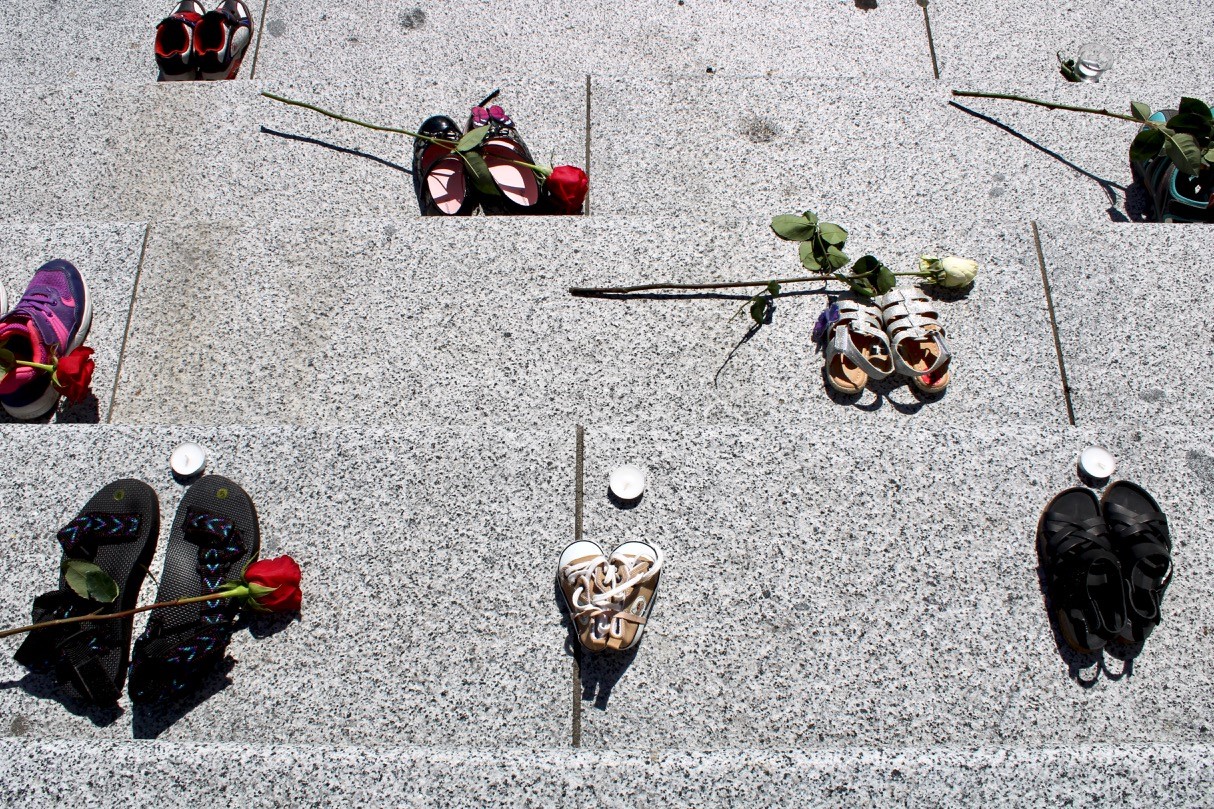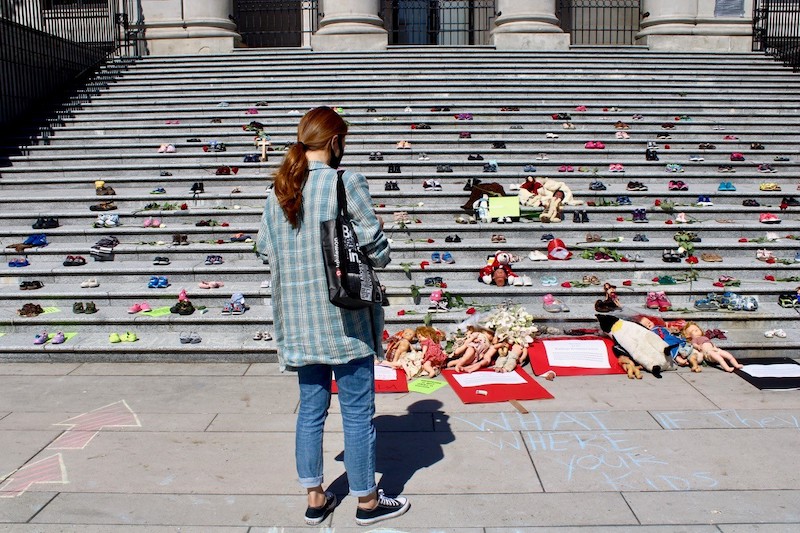“It is with a heavy heart that Tk’emlúps te Secwépemc Kukpi7 (Chief) Rosanne Casimir confirms an unthinkable loss that was spoken about but never documented by the Kamloops Indian Residential School. This past weekend, with the help of a ground penetrating radar specialist, the stark truth of the preliminary findings came to light — the confirmation of the remains of 215 children who were students of the Kamloops Indian Residential School.”
So begins an announcement released Thursday by the office of the Chief of the Tk’emlúps te Secwépemc, also called the Kamloops Indian Band.
On Friday, 215 pairs of shoes were placed on the steps of the Vancouver Art Gallery as a memorial to the latest, shocking reminder of the cruelty wrought by colonial institutions. The display was organized by a group of Indigenous women, led by Tamara Bell.
Delhia Nahanee, who is Nisga’a and has lived in the Squamish Nation community for 40 years, arrived to pay her respects, and spoke with Tyee reporter Jen St. Denis.
“When I read about the 200 kids and how they were found in a mass grave, it shook me,” she said. “It shook me to the core.
“What we were thinking about was the mothers — the mothers who had to let go of these children.
“I’ve worked as a social worker and I’ve worked on the other side, fighting the social workers, as an advocate for single mothers in the Downtown Eastside. I know for sure every mother fights like a dog to keep their child with them.
“I’m thinking about each mother who stood there, waiting for their child, maybe watching other children come home, and asking, ‘Where’s my child?’
“I wanted to come here and just stand with people, especially people who have been through residential schools and bring forth my voice as an advocate and bring forth voices of Elders and be there for people.”

Based on its ongoing research, the Truth and Reconciliation Commission of Canada concludes that more than 4,100 children died in the residential school system. The 215 children whose remains were discovered on the grounds of the former Kamloops residential school are believed to be undocumented. Work continues to find any records.
“Tk’emlúps te Secwépemc will continue to work with the ground penetrating radar specialist to complete the survey of the former Kamloops Indian Residential School grounds. In undertaking this current investigation, Tk’emlúps te Secwépemc Chief and Council would like to acknowledge the preliminary work that was carried out in the early 2000s,” said the release from the Nation. “With access to the latest technology, the true accounting of the missing students will hopefully bring some peace and closure to those lives lost and their home communities.
“Kukpi7 Rosanne Casimir stated, ‘We are thankful for the Pathway to Healing grant we received to undertake this important work. Given the size of the school, with up to 500 students registered and attending at any one time, we understand that this confirmed loss affects First Nations communities across British Columbia and beyond. We wish to ensure that our community members, as well as all home communities for the children who attended are duly informed.'
“‘This is the beginning but, given the nature of this news, we felt it important to share immediately. At this time we have more questions than answers. We look forward to providing updates as they become available.’”
A national Indian Residential School Crisis Line provides 24-hour support for former students and those affected, including referrals to emotional and crisis services. Call 1-866-925-4419.
Within B.C., the KUU-US Crisis Line Society providing First Nations and Indigenous-specific support can be reached toll-free at any time at 1-800-588-8717 or online at kuu-uscrisisline.com.
The Tyee will continue to cover this unfolding story and critical issue. Below are a dozen related past articles containing the perspectives of Indigenous people, including residential school survivors. Please share with others seeking the context for Thursday’s terrible revelations.
To Break Residential Schools’ Dark Legacy, Understand Why Know the roots of Canada’s incarceration of native children and see why effects linger. By Kevin Ward
For First Nations, These Are Precedented Times The pain of loss. Forced isolation. Unimaginable grief. We know them all. By Hilistis Pauline Waterfall
Still Surviving: Reconciliation through Everyday Rebellion Residential school survivors rebuild through small acts of hope and resistance. By Meghan Mast
Still Surviving: ‘It’s Always on the Edge of Things’ For residential school survivors, quiet power in daily tasks. By Meghan Mast
How Canada Created a Crisis in Indigenous Child Welfare From residential schools to the Sixties Scoop, governments set out to undermine Indigenous families. By Katie Hyslop
Why Canada and Genocide Belong in the Same Sentence Was there a pre-meditated plan to cause Indigenous people such suffering? Undeniably. By Rick Harp
‘Horrible’ Residential School to Be Razed and Replaced with Cultural Centre The demolition of Lower Post school building is ‘a chance to start that healing process.’ By Amanda Follett Hosgood
There Is Truth Here: The Power of Art from Residential Schools on Display Museum of Vancouver exhibition pays tribute to the resiliency and abilities of students. By Emily McCarty
A Reconciliation Warning from an Abbotsford Classroom A Grade 6 assignment on ‘positive’ residential school stories was no outlier for BC’s schools. By Nick XEMTOLTW Claxton and Jason M. Price
The Gladys We Never Knew She is one, among thousands, who didn’t survive residential school. But students can meet her today. By Nancy Knickerbocker
‘Now that You Know, You Can’t Turn a Blind Eye’ Author, activist Bev Sellars on her book ‘Price Paid: The Fight for First Nations Survival.’ By Heather Ramsay
‘I Was Alone in a Canoe. But It Was a Magic Canoe’
Wa’xaid has died. Cecil Paul’s life shone the way to preserve nature, culture, community and hope.
By Ian Gill ![]()
Read more: Indigenous, Rights + Justice
















Tyee Commenting Guidelines
Comments that violate guidelines risk being deleted, and violations may result in a temporary or permanent user ban. Maintain the spirit of good conversation to stay in the discussion.
*Please note The Tyee is not a forum for spreading misinformation about COVID-19, denying its existence or minimizing its risk to public health.
Do:
Do not: